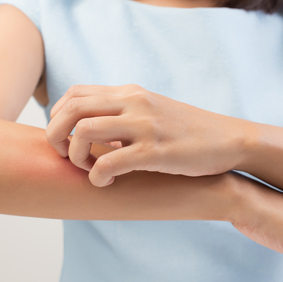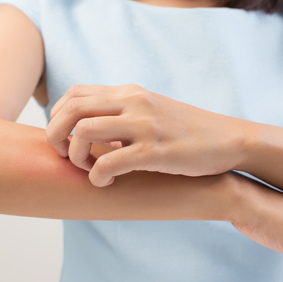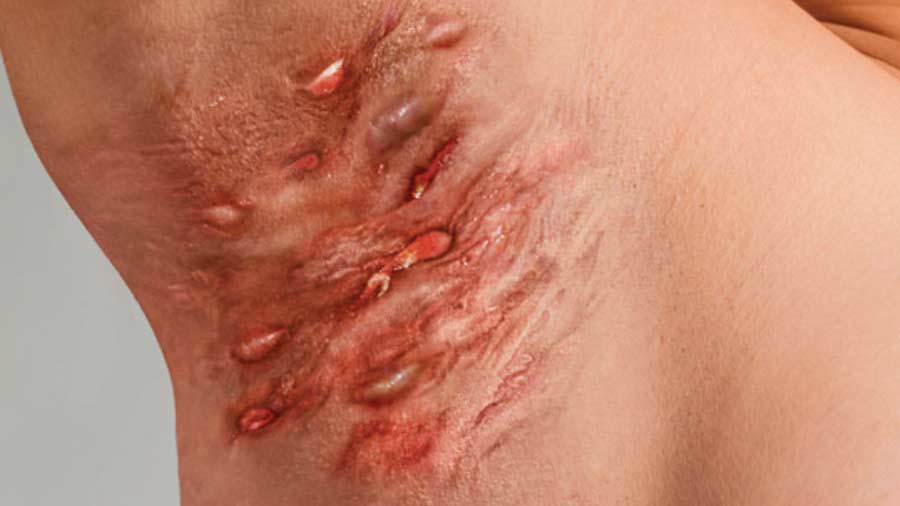
You know that awful feeling in the morning when you wake up after breathing in the harsh, dry air all night, right? Itchy, dry skin. Dry throat. Dry eyes. Low moisture levels can also affect your pets health, in addition to hard wood floors and furniture in your home. Humidifiers offer an inexpensive way to relieve those discomforts.
Humidifiers are especially helpful during the colder months of the year because winter is extra challenging in two ways: artificial heat makes indoor air extremely dry, and seasonally frigid temps make the outdoor air dry. Those are tough conditions for your skin, especially if you suffer from from eczema, psoriasis, and dry skin.
Which type of humidifier is right for you?
There are five main categories of humidifiers, each with a different method of getting the moisture in the air.
Evaporators — Humidity is produced by a fan that draws the air in from the room and blows it over or through a moistened wick in water. Some of this water evaporates and this water vapor is added to the air which increases its humidity.
Central humidifier — A central humidifier is installed in your ductwork near your furnace, either on the supply or return end. The unit is also connected directly to your home's water supply. Inside of the humidifier is either a humidifier pad, a rotating drum or a steaming system that is used to distribute water to your home's air.
Impeller humidifier — These use a rotating disc to fling water at a diffuser, which breaks the water into fine droplets that float into the air. The water supply must be kept scrupulously clean, or there is a risk of spreading bacteria or mold into the air.
Ultrasonic humidifier — With both cool and warm mist options available, ultrasonic humidifiers are versatile. These produce a mist with the help of ultrasonic vibrations. They may also be available in varying sizes..
Steam vaporizer — These humidifiers work by heating water and then cooling it down before pushing it into the air. They are small, portable and cheap to purchase.
Warm mist vs. cool mist: which is better?
Pros and cons of a cool mist humidifier
Some of the benefits of cool mist humidifiers include:
- They use less electricity than warm mist humidifiers.
- The water is cold, not hot, so if a child knocks the unit over he or she will not be burned.
The cons of cool mist humidifiers are:
- They can be more noisy than warm mist units.
- The cool mist can actually reduce the ambient temperature of the room.
Pros and cons of a warm mist humidifier
The benefits of warm mist humidifiers are:
- They are usually quieter than cool mist humidifiers.
- The boiling process can help keep them cleaner than cool mist humidifiers.
Disadvantages of warm mist humidifiers include:
- They work better in small rooms, not large areas.
- They contain boiling water, which is a burn hazard if tipped over.
- The boiling process requires more electricity to use.
- They can be more difficult to clean due to the minerals left behind from boiling the water.
Don't forget to clean your humidifier.
Warm, moist environments do one thing really, really well: they breed bacteria. That's why it's so important to clean them out once a week. Cleaning is rather simple, and can usually be done with soap and water, or water and vinegar (just read the user manual for your model). You certainly don't want it to become a breeding ground for bacteria, fungi, yeast and even mold.
Benefits for all.
Humidified air makes it harder for airborne viruses and bacteria to survive. It is easier to breathe. Humidified air moisturizes everything in your home, including your wood flooring, which can crack in overly dry environments. If you do come down with a cold or the flu, your symptoms may be worse in dry air. Even your house plants will thank you!
 Red, itchy, raw skin is a given during the winter. But what does it mean?
Dry skin is not usually a serious health problem, though it can develop and worsen into chronic issues like eczema and broken skin that may become infected. Still, that constant itch and pulling feeling is not pleasant.
Here are some possible causes of itchy skin, and suggestions on how to fix them:
1. Hydration
Do you drink enough water? Health experts suggest drinking 64 ounces of water a day. That's half of a gallon! Your first step to better hydrated skin is to better hydrate your entire body. You'll feel the benefits from the inside out.
2. Moisturize
Use a high quality moisturizer all over your body as soon as you get out of the shower. Petroleum jelly such as Aquaphor is a great product that will give you a lasting moisturized feeling.
3. Humidifiers
Use a humidifier in your home to combat that winter heating dry air, which will suck the moisture right out of your skin. You also might find that you cough and sneeze less with a higher humidity level in your home.
4. Avoid scratching
That's right, scratching might feel good for a second but ultimately will damage the skin further, making it harder to heal and retain moisture. Use anti-itch cream or lotion instead of scratching.
5. Scents
Avoid products with scents added, like laundry detergent, soap, and lotions. These are often alcohol based irritants.
6. Water temperatures
Consider turning down the heat in the shower or bath. Hotter water strips moisture out of skin. Also be wary of taking long showers or baths, as the water will actually dehydrate your skin, making it more itchy.
Contact us today if you'd like to join our ongoing Pruritus (Itch) study in our Johnston, RI location.
Red, itchy, raw skin is a given during the winter. But what does it mean?
Dry skin is not usually a serious health problem, though it can develop and worsen into chronic issues like eczema and broken skin that may become infected. Still, that constant itch and pulling feeling is not pleasant.
Here are some possible causes of itchy skin, and suggestions on how to fix them:
1. Hydration
Do you drink enough water? Health experts suggest drinking 64 ounces of water a day. That's half of a gallon! Your first step to better hydrated skin is to better hydrate your entire body. You'll feel the benefits from the inside out.
2. Moisturize
Use a high quality moisturizer all over your body as soon as you get out of the shower. Petroleum jelly such as Aquaphor is a great product that will give you a lasting moisturized feeling.
3. Humidifiers
Use a humidifier in your home to combat that winter heating dry air, which will suck the moisture right out of your skin. You also might find that you cough and sneeze less with a higher humidity level in your home.
4. Avoid scratching
That's right, scratching might feel good for a second but ultimately will damage the skin further, making it harder to heal and retain moisture. Use anti-itch cream or lotion instead of scratching.
5. Scents
Avoid products with scents added, like laundry detergent, soap, and lotions. These are often alcohol based irritants.
6. Water temperatures
Consider turning down the heat in the shower or bath. Hotter water strips moisture out of skin. Also be wary of taking long showers or baths, as the water will actually dehydrate your skin, making it more itchy.
Contact us today if you'd like to join our ongoing Pruritus (Itch) study in our Johnston, RI location.





